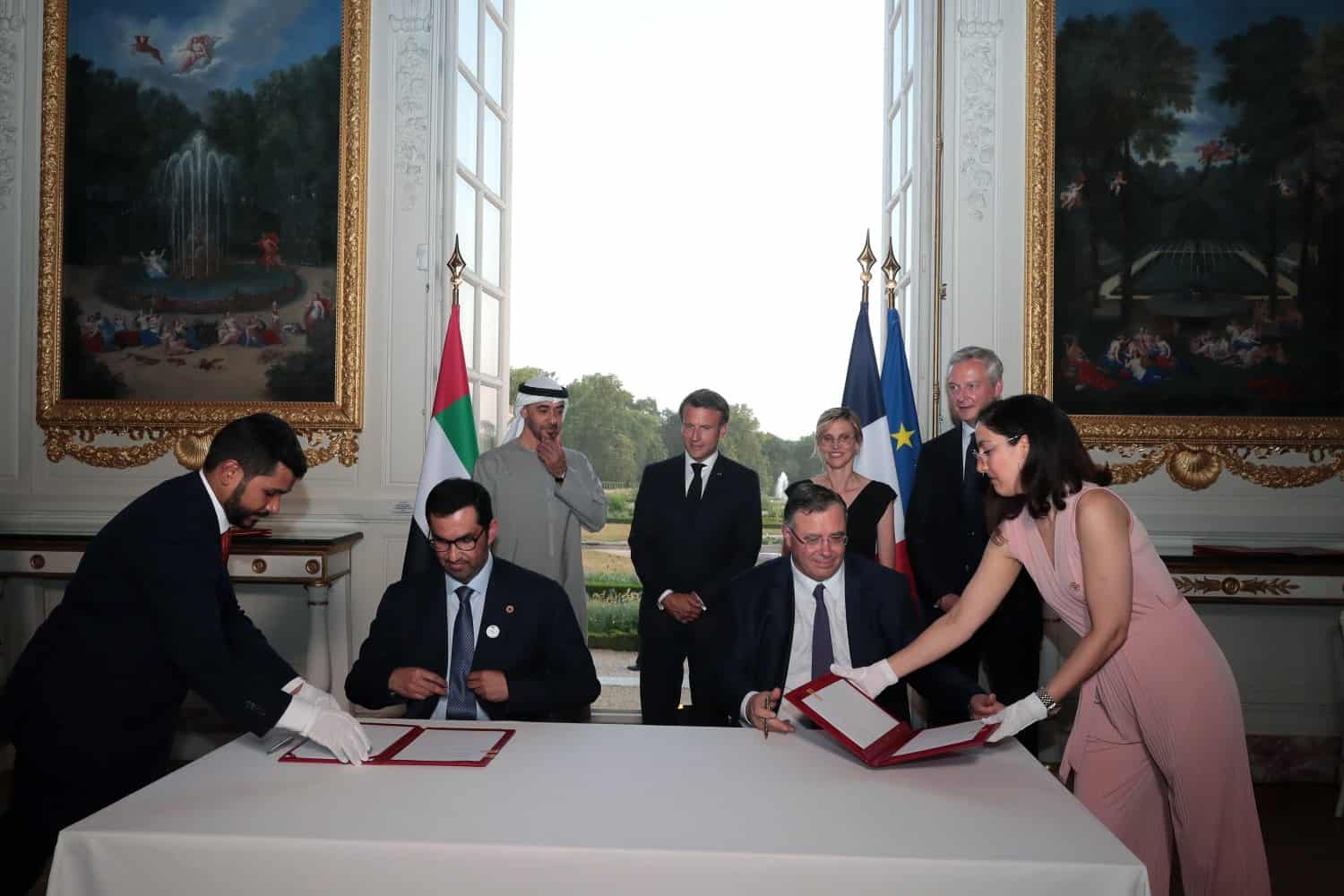The UAE and France late Monday signed a number of agreements and Memoranda of Understanding (MoUs) aimed at enhancing bilateral relations in various vital fields as part of the current visit of President Sheikh Mohamed bin Zayed Al Nahyan to France.
While about a dozen deals were signed, the UAE President and his French counterpart Emmanuel Macron witnessed the signing of two key agreements. The first was a Comprehensive Strategic Energy Partnership (CSEP) between the United Arab Emirates (UAE) and France. The second was a strategic partnership agreement between ADNOC and TotalEnergies.
The UAE-France CSEP focuses on enhancing energy security, energy affordability and decarbonisation, as well as progressive climate action ahead of COP28 (28th Session of the Conference of the Parties) which is set to take place in the UAE in 2023.
The landmark partnership builds on the strong, close and long-standing bilateral relations between both countries and leverages the UAE’s position as a responsible and reliable supplier of energy.
The UAE holds the sixth-largest crude oil reserves in the world and is committed to enabling global energy security.
Through a balanced and pragmatic approach to the energy transition, the UAE is expanding its crude oil production capacity to five million barrels per day while growing its global renewable energy capacity from 23 gigawatts (GW) to over 100GW by 2030.
The UAE is also investing over $50 billion in clean energy projects in six continents, including in 27 climate vulnerable island nations, through Masdar, the Abu Dhabi Future Energy Company, as well as other UAE platforms.
The agreement was signed by Dr Sultan Ahmed Al Jaber, UAE Minister of Industry and Advanced Technology, Bruno Le Maire, French Minister of Economy, Finance, and Industrial and Digital Sovereignty, as well as Agnès Pannier-Runacher, French Minister of Energy Transition.
Other agreements and MoUs signed and exchanged by the two sides included:
- A Letter of intent regarding granting permission to family members of staff of diplomatic missions and the Ministry of Foreign Affairs and International Cooperation to engage in business. They were signed by Sheikh Abdullah bin Zayed Al Nahyan, Minister of Foreign Affairs and International Cooperation, and Minister for Europe and Foreign Affairs of France, Catherine Colonna.
- A joint declaration on cooperation between the UAE and France in the higher education field, signed by H.H. Sheikh Abdullah bin Zayed Al Nahyan, Minister of Foreign Affairs and International Cooperation, and Minister for Europe and Foreign Affairs of France, Catherine Colonna.
- A MoU between the Ministry of Industry and Advanced Technology and Avnor Group for cooperation in the field of standardisation.
- A MoU between the Office of the UAE Special Envoy for Climate Change and the French Government in the field of climate action, signed by Dr. Sultan bin Ahmed Al Jaber, UAE Special Envoy for Climate Change, and Agnès Pannier-Runacher, French Minister of Energy Transition.
- A road map for cooperation between the Tawazun Economic Council of the United Arab Emirates and the General Directorate of Armaments in the French Ministry of Defence, signed by Ahmed Al Harmoudi, CEO of the Council, and armament engineer Thierry Carlier, Director of International Development in the French General Directorate for Armaments.
- A MoU between the Mohammed Bin Rashid Space Centre (MBRSC) and the National Centre for Space Studies (CNES) on cooperation in lunar exploration. It was signed by Salem Humaid Al Marri, Director General of the MBRSC, and Philippe Baptiste, President of the CNES.
- A letter of intent on earth observation between MBRSC and the CNES.
- Letter of Intent regarding human spaceflight activities between the MBRSC and the CNES.
- A MoU for cooperation between the Pasteur Institute and the Abu Dhabi Public Health Center (ADPHC) and was signed by Matar Saeed Al Nuaimi, Director General of the ADPHC, and Professor Stewart Cole, President of the Pasteur Institute.
- The founding contract of NT Energies between Technip and the National Petroleum Construction Company (NPCC). It was signed by Ahmed Al Dhaheri, CEO of NPCC, and Arnaud Pieton, CEO of Technip.
The UAE is represented by the Ministry of Industry and Advanced Technology and Abu Dhabi National Oil Company (ADNOC), while France is represented by the Ministry of Economy, Finances and Industrial & Digital Sovereignty, and the Ministry of Ecological Transition.
Dr Al Jaber said: “The UAE, under the wise leadership of President His Highness Sheikh Mohamed bin Zayed Al Nahyan, continues to consolidate its position as a reliable energy provider and key contributor to global energy security while advancing progressive climate action. France is a close, long-standing strategic partner of the UAE, and this Comprehensive Strategic Energy Partnership provides a robust platform for us to work together to better deliver secure, affordable and sustainable energy required to drive economic growth and prosperity for our countries and the world.
“The landmark agreement deepens the cooperation between our countries across the energy value chain and unlocks technology and energy solutions that are good for the climate and the economy. In line with the vision of the UAE’s wise leadership, we will continue to build bridges of partnership across conventional and new energies, as well as capitalise on the economic opportunities of the energy transition, strengthen industrial cooperation and drive sustainable growth.”
Macron’s aides had earlier said that France was eager to secure diesel from the strategic Middle Eastern nation.
“The UAE is keen to support energy security in the world in general and in France in particular,” Sheikh Mohamed told Macron, according to Emirati state news agency WAM.
Before the trip, his diplomatic advisor Anwar Gargash had stressed how the UAE was looking to reorient its supplies towards Europe.
“We have sold our oil to the far east for 40 years and now we are directing it toward Europe in this time of crisis,” he told reporters.








